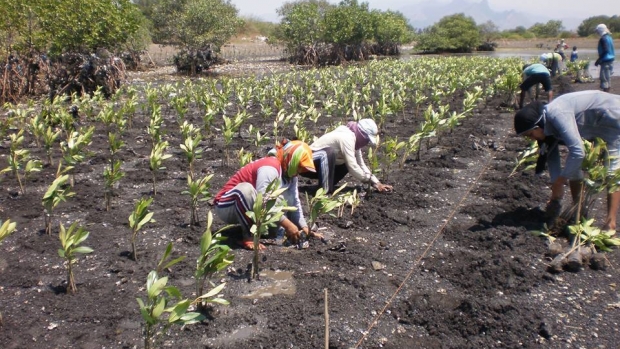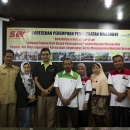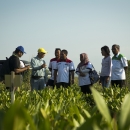Grants :: Small Grant Facilities :: Community Awareness Raising on Mangrove Rehabilitation, Management and Utilization
Community Awareness Raising on Mangrove Rehabilitation, Management and Utilization

About 25,000 mangrove seedlings planted by coastal community ... , Peleyan village, Situbondo, East Java © MFF IUCN, 2014
Objectives
To rehabilitate mangrove ecosystem in order to protect coastal community from abrasion and to improve community awareness on the importance of mangrove ecosystem
Background
Peleyan village in Situbondo regency has a wide coastal area and has suffered the most from coastal erosion. It is also located in an area most severely affected by mangrove conversion to aquaculture ponds, which often have permanent or semi-permanent dikes, preventing the natural tide from coming in.
Surrounded by massive abandoned shrimp ponds developed from 1997, Situbondo coastal areas are experiencing the lost of coastal line due to the strong current resulted in abrasion. This condition is mainly due to the absent of natural wall, including mangrove vegetation.
Target beneficiaries
In general, at least 4,800 people in Peleyan village will receive benefit from mangrove rehabilitation efforts. Specific beneficiaries of livelihood training activities are two women's groups in the village.
Outputs
- 130,000 mangrove seeds were planted with 83% growth rate to rehabilitate 3.2 Ha mangrove area;
- 2 community groups were established and received trained on mangrove management;
- Women’s group participated on the project implementation – mangrove rehabilitation process and awareness discussion;
- Women’s group participated on mangrove-based food processing training conducted by other grantee (Sido Agung);
- Local government acknowledgment and contribution to the project implementation – participation and contribution on the stakeholder awareness discussion.
Accomplishments and challenges
- A total of 60 group members participated during the early initiation of the project and decreased to 45 members during the last monitoring on March 2015;
- A training on mangrove rehabilitation introduction and technique has been provided to group members prior to the implementation of rehabilitation works. In addition, a general public awareness session on mangrove ecosystem has been carried out in collaboration with Environment Office, Situbondo district;
- Mangrove Planting. A total of 100,000 seedlings have been prepared in the nursery with very high growth success (>95%). Additional 30,000 seedlings voluntary provided by SAR and community group members in the nursery. All seedlings have been planted in the rehabilitation sites with growth success 83%. Enrichment planting is done beyond the project period using the additional seedlings;
- The mangrove planting site heavily disturbed by transported rubbish from estuary. In addition, growth success is disturbed by bivalve on the trunk of the trees;
- Fair knowledge on mangrove rehabilitation resulted in from the engagement of skillful experts, but need further improvement on the mangrove rehabilitation experience;
- Good location of nursery, with regular tidal influence, and close to the planting area.
Contributions to cross-cutting themes
- Climate change and disaster risk reduction
130,000 mangrove seedlings were planted to rehabilitate 3.2 Ha mangrove area. This will prevent coastal erosion in the area.
- Gender equality
Women’s group participated on the project implementation – mangrove rehabilitation process and awareness discussion and took part on mangrove-based food processing.
- Knowledge management and communications
Fair knowledge on mangrove rehabilitation resulted in from the engagement of skillful experts.
Lessons Learned
- A comprehensive pre-assessment in identifying rehabilitation site should be emphasized during the initial orientation session / Project Cycle Management (PCM) training: 'the opportunities for seedlings to thrive, not the number of seedlings to be planted';
- Training on mangrove rehabilitation provided before the project implementation can significantly increase grantee's capacity and experience.
Project Facts
Country
Location
Peleyan village, Kecamatan, Panarukan District, Situbondo, East Java
Topic
Duration
11th Apr 2014 to 10th Apr 2015
MFF Grant Amount
IDR 190,000,000
Implementing Partner
Simphoni Akar Rumput (SAR)
Jln. Anggrek Gg.2A Rt.03 Rw.03 Kel. Patokan, Situbondo sub-district, Situbondo District, East Java Province
Contact person: Heri Sugianto
Mobile: +6281336672555
Email address: lsm_sar@yahoo.co.id


